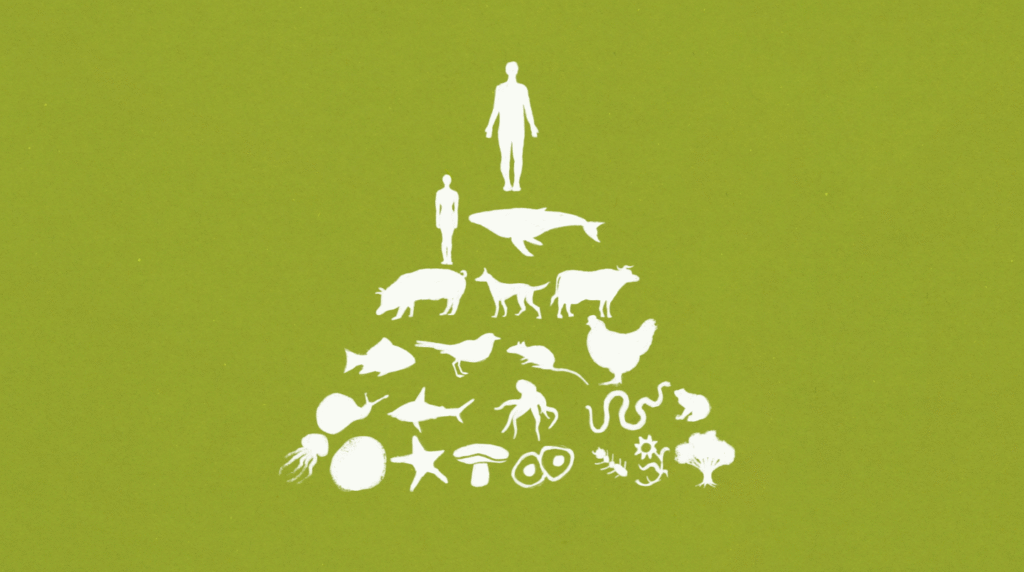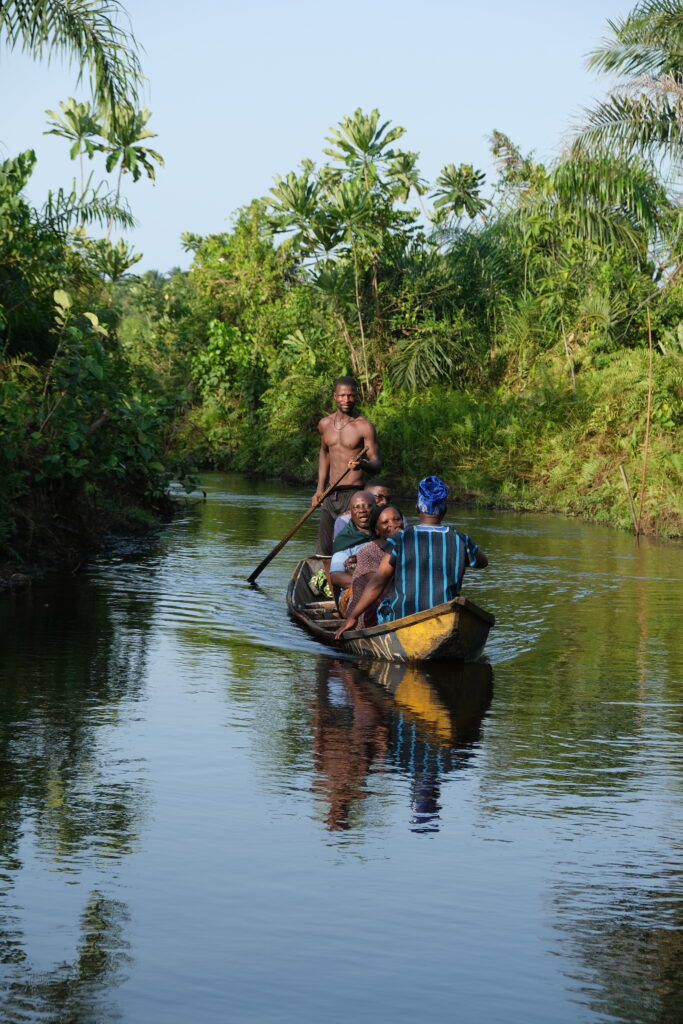Earth Jurisprudence
Earth Jurisprudence is the lodestar by which we navigate. The philosophy was founded by Thomas Berry and inspired by indigenous ways of seeing and being, which are centred around relationship with the wider community of life. The Collective is putting Earth Jurisprudence into practice across Africa: many communities are once again walking in rhythm with Earth, remembering who they are and the home they are called to protect.
What is jurisprudence?
‘Jurisprudence’ is the theory of law that defines how we govern ourselves. Western jurisprudence – currently dominant worldwide – considers humans as separate from, and superior to, nature. The laws stemming from it legitimise the destruction of our home.
As a result, we are living through multiple, intertwined crises. The mindset and actions promoted by western jurisprudence fuel climate chaos, kill our wild kin, and widen inequality.
Thomas Berry believed the roots of these crises lie, ultimately, in a crisis of our imagination. This is why, for many of us, it is easier to imagine the end of the world than the end of the dominant paradigm.

"The deepest crises experienced by any society are those moments of change when the story becomes inadequate for meeting the survival demands of the present situation."
Thomas Berry
As a cultural historian, Thomas reminded us that civilisations which grow rapidly by destroying their life support system, collapse rapidly too. As a philosopher, he proposed that we transform from a human-centred to an Earth-centred consciousness; from breaking to complying with the inherent, living laws and limits of life on our planet.
This is what he called Earth Jurisprudence.
An Industrial Era Idea:
The present international legal system is based on a jurisprudence developed during the industrial era to serve colonists, industrialists and corporations.
This western jurisprudence is anthropocentric, considering nature to be an inanimate resource: something we can use or abuse without consequence.


A Life-Sustaining Alternative:
Earth Jurisprudence is life-sustaining. It recognises that we are born into a lawful universe, and that human law needs to be derived from the Earth’s laws if we are to live in harmony with our home.
Over the past two decades, Earth Jurisprudence has inspired a cascade of innovative legal ideas at local, national and international level. A recent UN report describes it as “the fastest growing legal movement of the twenty-first century”.
Origins
Earth Jurisprudence is both innovative and ancient. Thomas Berry was clear that, whilst it may be a new term that is stimulating new laws, Earth Jurisprudence is not a new philosophy or practice. He pointed towards two sources of inspiration: Mother Earth and Indigenous Peoples.

“We hold the memory of what it means to be human… I think people should pay close attention to this. Even if we had all the white people’s technology and money, we would be worth nothing if we did not hold the memory of the creation of the world.”
Ailton Krenak, Indigenous leader from Brazil

Mother Earth:
Nature was described by Thomas as our ‘primary text’: the ultimate source of laws by which human societies should govern themselves.
Our planet is, as Thomas said, “a communion of subjects, not a collection of objects”. These subjects – plants, animals, water, soil, minerals – exist in a dynamic relationship to one another, within a living, self regulating system.
When the laws and processes by which the complex, beautiful Earth system regulates herself are observed, our planet produces the conditions that allow the community of life, including human beings, to flourish.
Indigenous Peoples:
Indigenous Peoples who organise themselves according to ecological laws still demonstrate a deep-rooted relationship with Earth, despite the industrial onslaught.
Their multi-generational engagement with the places they live forms the foundation of their governance systems, sustaining cultural and ecological diversity. And they have developed sophisticated ways of ensuring each new generation understands the lawfulness of the world they are born into.
Thanks to them, we can see the potential for humans to thrive whilst maintaining the dynamic equilibrium upon which the wellbeing of all depends. Earth’s gift of many diverse ecosystems is reciprocated by our diverse cultural adaptation to them.
Why Earth Jurisprudence matters now
The fabric of life on Earth is unravelling. Over a million species are in imminent danger of disappearing. Known as the sixth mass extinction, this rapid decline in diversity is the direct result of industrial growth. Human lives are also being displaced or lost to climate chaos, pandemics and conflict, all escalated by corporate greenwashing, right-wing politics, and inequity. At a critical time, Earth Jurisprudence offers a powerful medicine.

“We cannot solve our problems with the same thinking that created them in the first place.”
Albert Einstein
The Unravelling:
The undoing of our life support system is an inevitable consequence of taking more than nature can replenish, of poisoning her waters, of digging up what was buried, of manufacturing waste that cannot be re-integrated.
The roots of the converging crises we face lie, ultimately, in our broken relationship with Mother Earth – of seeing ourselves as separate and superior to the living systems that sustain us.
The Reweaving:
What is healing, regenerative, and realistic for Earth, not for human-centred politics or economics, must be our ultimate guide to what we do next. Thomas Berry believed the “Great Work” of our time to be transforming from our current human-centred perspective to this Earth-centred perspective.
It is a remembering of who we are as human beings, and requires a radical shift from feeling threatened by diversity – be it ‘other’ human communities or ‘other’ species – to embracing and acting in solidarity with them.
To comply with the ecological laws that allow all these beings to thrive, we must know them. This means relearning eco-literacy after generations of disconnection from nature. When we see life from an Earth-centred perspective, as Thomas Berry did and Indigenous Peoples do, we are compelled to take responsibility – not only for personally prioritising the web of life around us, but also for collectively re-shaping the institutions we encounter.

Earth Jurisprudence in practice
Find out how the philosophy of Earth Jurisprudence in being put into practice, from a local to international scale.

"As members of the African Earth Jurisprudence Collective, we are helping communities revive their relationship with the land by remembering and celebrating their customary law — whether that is practiced through how they save seed, how they farm, or how they protect sacred natural sites."
Mashudu Takalani, Earth Jurisprudence Practitioner, South Africa

Grassroots action:
The courageous communities accompanied by the African Earth Jurisprudence Collective are healing the harms of colonialism and all that has followed. Earth Jurisprudence is once again becoming a living reality: kept alive through law, ceremony, and story.
Their grounded examples – from national legal protection for sacred forests in Benin to council support of indigenous custodians in Uganda – are testament to the fact that alternatives to western jurisprudence already exist.
This work is an inspiration for us all to ask: What could we do?
Legal action:
Earth Jurisprudence invites us to decolonise our thinking about where law comes from. It has been the inspiration for exciting evolutions of the legal system.
For example, the idea of the Rights of Nature was first explored by legal scholar Christopher Stone in 1972. Recognition of the Rights of Nature within western legal systems is an important stepping stone towards an ecocentric orientation. It is one legal tool, among others, through which a paradigm shift can be realised.
Earth Jurisprudence includes recognition of the Rights of Nature, but challenges us go further: to recognise these as inherent rights of every being, not just an extension of human rights. And transformation beckons when we realise that the source of law is nature herself, as indigenous communities have known forever.

It All Starts With Opening Our Hearts
Read a conversation between Practitioners Gertrude Pswarayi-Jabson and Mashudu Takalani, published in Langscape Magazine, about rights and responsibilities.


